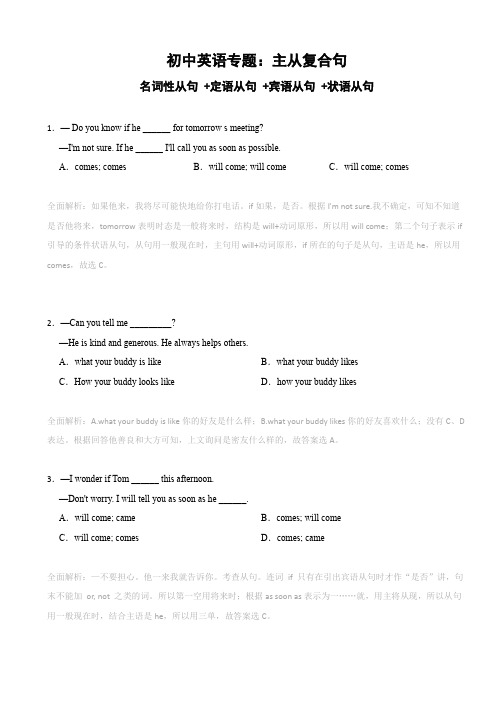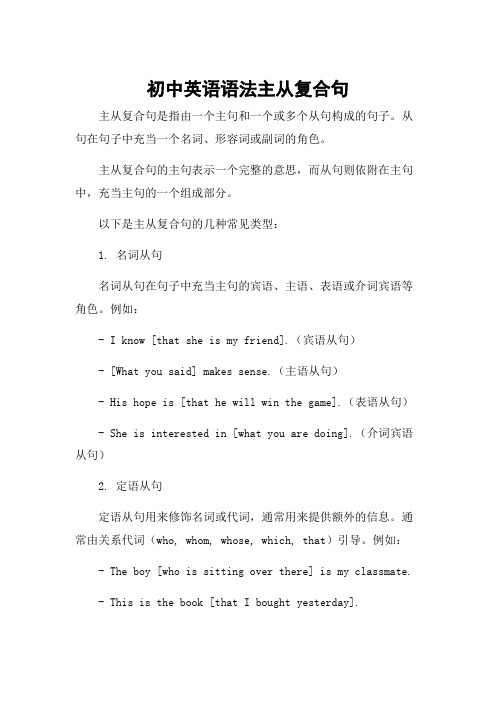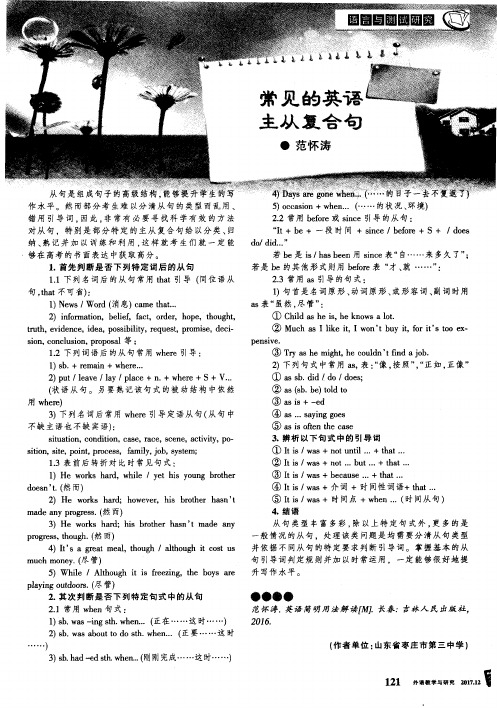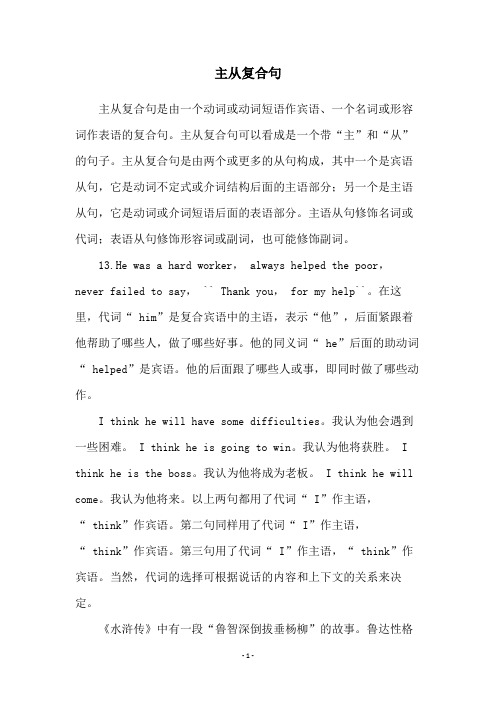英语主从复合句大全
九年级英语主从复合句(名词性从句 +定语从句 +宾语从句 +状语从句 )

初中英语专题:主从复合句名词性从句 +定语从句 +宾语从句 +状语从句1.— Do you know if he ______ for tomorrow s meeting?—I'm not sure. If he ______ I'll call you as soon as possible.A.comes; comes B.will come; will come C.will come; comes全面解析:如果他来,我将尽可能快地给你打电话。
if如果,是否。
根据I'm not sure.我不确定,可知不知道是否他将来,tomorrow表明时态是一般将来时,结构是will+动词原形,所以用will come;第二个句子表示if 引导的条件状语从句,从句用一般现在时,主句用will+动词原形,if所在的句子是从句,主语是he,所以用comes,故选C。
2.—Can you tell me _________?—He is kind and generous. He always helps others.A.what your buddy is like B.what your buddy likesC.How your buddy looks like D.how your buddy likes全面解析:A.what your buddy is like你的好友是什么样;B.what your buddy likes你的好友喜欢什么;没有C、D 表达。
根据回答他善良和大方可知,上文询问是密友什么样的,故答案选A。
3.—I wonder if Tom ______ this afternoon.—Don't worry. I will tell you as soon as he ______.A.will come; came B.comes; will comeC.will come; comes D.comes; came全面解析:—不要担心。
初中英语语法主从复合句

初中英语语法主从复合句主从复合句是指由一个主句和一个或多个从句构成的句子。
从句在句子中充当一个名词、形容词或副词的角色。
主从复合句的主句表示一个完整的意思,而从句则依附在主句中,充当主句的一个组成部分。
以下是主从复合句的几种常见类型:1. 名词从句名词从句在句子中充当主句的宾语、主语、表语或介词宾语等角色。
例如:- I know [that she is my friend].(宾语从句)- [What you said] makes sense.(主语从句)- His hope is [that he will win the game].(表语从句)- She is interested in [what you are doing].(介词宾语从句)2. 定语从句定语从句用来修饰名词或代词,通常用来提供额外的信息。
通常由关系代词(who, whom, whose, which, that)引导。
例如:- The boy [who is sitting over there] is my classmate.- This is the book [that I bought yesterday].- The woman [whose car was stolen] reported it to the police.3. 状语从句状语从句用来修饰主句中的动词,形容词或副词,提供额外的信息。
常见的状语从句有时间状语从句、原因状语从句、结果状语从句、条件状语从句和方式状语从句等。
例如:- She went to bed [after she finished her homework].(时间状语从句)- He failed the exam [because he didn't study].(原因状语从句)- They are so tired [that they can't walk anymore].(结果状语从句)- If it rains tomorrow, [we will stay at home].(条件状语从句)- He did it [in the way that she had instructed].(方式状语从句)以上是主从复合句的几种常见类型,。
主从复合句例句

主从复合句例句主从复合句是英语写作中常见的一种句子结构。
它由一个主句和一个或多个从句组成,从句在句中充当主句的补充、解释或限制等作用。
下面是一些例句,以帮助您更好地理解主从复合句的用法。
1. Although it was raining, we decided to go for a walk.虽然下雨,但我们决定去散步。
这个例句中,从句“Although it was raining”起到补充说明从句“we decided to go for a walk”的作用。
2. I will wait here until you come back.在你回来之前,我会在这里等待。
这个例句中,从句“until you come back”起到限制主句“I will wait here”的作用。
3. She always carries an umbrella in case it rains.她总是带把伞以防下雨。
这个例句中,从句“in case it rains”起到解释主句“She always carries an umbrella”的作用。
4. My brother, who is a doctor, works at the local hospital.我的弟弟是一名医生,他在当地医院工作。
这个例句中,从句“who is a doctor”起到说明主句“My brother works at the local hospital”的作用。
5. After I finish my work, I will go to the gym.我完成工作后,我会去健身房。
这个例句中,从句“After I finish my work”起到补充说明主句“I wil l go to the gym”的作用。
6. The book that I am reading is very interesting.我正在读的那本书很有趣。
常见的英语主从复合句

p og r r e s s , t h o u g h . ( 然 而)
4 . 结 语
m a d e a n y p r o g r e s s . ( 然 而)
3 1 He w o r k s h a r d ;h i s b r o t h e r h a s n’ t ma d e a n y
从句 类型丰 富多彩, 除以上特定 句式外 , 更 多 的是
s i t ua t i o n,c o nd i t i o n ,c a s e ,r a c e ,s c e ne ,a c t i vi t y,p o—
④a s …s a y i n g g o e s
⑤ a s i s o t f e n t h e c a s e
t r u t h , e v i d e n c e , i d e a ,p o s s i b i l i t y , r e q u e s t , p r o mi s e ,d e c i -
若b e是 i s / h a s b e e n用 s i n c e表 “ 自… … 来 多久 了” : 若是 b e的其 他 形 式 则用 b e f o r e 表 “ 才、 就 ……” : 2 . 3常用 a s 引导的句式: 1 ) 句首是名词原形、 动词 原 形 、 或形容词 、 副词时用 a s 表“ 虽然 , 尽管 ” :
1 1 He wo r k s h a r d ,wh i l e /y e t h i s y o u n g b r o t h e r
② I t i s , w a s +n o t …b u t … +t h a t …
⑧ I t i s / w a s +b e c a u s e… +t h a t …
主从复合句的五种基本句型例句

主从复合句的五种基本句型例句一、主从复合句的概念主从复合句是由一个主句和一个或一个以上的从句构成的句子。
从句在主句中充当某个成分,如主语、宾语、表语、定语、状语等。
二、主从复合句的五种基本句型及例句1. 主语从句- 句型结构:从句作主语 + 谓语 + 其他成分。
- 例句:What he said is very important.(他所说的话非常重要。
在这个句子中,“What he said”是主语从句,在整个句子中充当主语,“is”是谓语)2. 宾语从句- 句型结构:主句主语 + 谓语 + 宾语从句(引导词 + 陈述语序句子)。
- 例句:I think that he will come.(我认为他会来。
“I”是主句主语,“think”是谓语,“that he will come”是宾语从句,作“think”的宾语)3. 表语从句- 句型结构:主句主语 + 系动词 + 表语从句。
- 例句:The problem is when we can get a pay rise.(问题是我们什么时候能涨工资。
“The problem”是主句主语,“is”是系动词,“when we can get a pay rise”是表语从句)4. 定语从句- 句型结构:主句(先行词 + 定语从句)。
- 例句:I like the book which/that was written by Lu Xun.(我喜欢鲁迅写的那本书。
“I”是主句主语,“like”是谓语,“the book”是先行词,“which/that was written by Lu Xun”是定语从句,用来修饰“the book”)5. 状语从句- 句型结构:主句 + 状语从句(根据不同的状语从句类型,引导词和结构有所不同)。
- 例句:When I was young, I liked reading very much.(当我年轻的时候,我非常喜欢阅读。
主从复合句

主从复合句主从复合句是由一个动词或动词短语作宾语、一个名词或形容词作表语的复合句。
主从复合句可以看成是一个带“主”和“从”的句子。
主从复合句是由两个或更多的从句构成,其中一个是宾语从句,它是动词不定式或介词结构后面的主语部分;另一个是主语从句,它是动词或介词短语后面的表语部分。
主语从句修饰名词或代词;表语从句修饰形容词或副词,也可能修饰副词。
13.He was a hard worker, always helped the poor,never failed to say, `` Thank you, for my help``。
在这里,代词“ him”是复合宾语中的主语,表示“他”,后面紧跟着他帮助了哪些人,做了哪些好事。
他的同义词“ he”后面的助动词“ helped”是宾语。
他的后面跟了哪些人或事,即同时做了哪些动作。
I think he will have some difficulties。
我认为他会遇到一些困难。
I think he is going to win。
我认为他将获胜。
I think he is the boss。
我认为他将成为老板。
I think he will come。
我认为他将来。
以上两句都用了代词“ I”作主语,“ think”作宾语。
第二句同样用了代词“ I”作主语,“ think”作宾语。
第三句用了代词“ I”作主语,“ think”作宾语。
当然,代词的选择可根据说话的内容和上下文的关系来决定。
《水浒传》中有一段“鲁智深倒拔垂杨柳”的故事。
鲁达性格粗暴,经常干些坏事,如把金翠莲母女俩逼得无处安身等。
他与李忠到渭州经商,住在客店里,晚上去听戏,却无意间发现隔壁酒店里有人偷看他们,便一怒之下把店主打死了。
后来,被逼无奈,只好投奔渭州经略府,在菜园里割草时,碰到了正在练武的林冲,二人一见如故,便结拜为兄弟。
鲁达性格急躁,爱吃酒,却能喝过十八碗,因此才和林冲相识。
初中英语专题:主从复合句 (名词性从句 +定语从句 +宾语从句 +状语从句 )
初中英语专题:主从复合句名词性从句 +定语从句 +宾语从句 +状语从句1.You should(应该)see a doctor,____you don't feel well.A.if B.and C.after D.before全面解析:if,连词,如果;and,连词,和;after,连词,在……后;before,连词,在……前;根据" You should(应该)see a doctor,……you don't feel well."可知这是一个条件状语从句,要表达如果你感觉不舒服的话应该去看医生,故选A。
2.We will go camping if it ____ tomorrow.A.rains B.will rain C.doesn't rain D.won't rain.全面解析:A一般现在是肯定形式,B将来时,C一般现在是否定形式,D一般将来时否定形式,If引导的条件状语从句,主句用一般将来时,从句要用一般现在时,主语是第三人称单数it,去宿营的前提是不下雨,所以用否定句,故选C。
3.—What are you going to do this Sunday?—If it is sunny, I ____ camping with my friends.A.will go B.went C.go全面解析:A一般将来时,B一般过去时,C动词原形,If引导的条件状语从句,主句的时态要用一般将来时,故选A。
4.—Did you tell Jack about the good news?—Oh, I was so busy these days that I just itA.forget B.forgetting C.forgot D.forgets全面解析:A动词原形,B动词的现在分词或者动名词,C动词的过去式,D动词的第三人称单数。
初中英语语法主从复合句
初中英语语法主从复合句主从复合句是指一个句子中包含一个主句和一个或多个从句。
从句是与主句含义相关的附属句,通常由连词引导。
1. 主句+从句:主句:I will go to the cinema tonight.从句:because it's my favorite movie.2. 主句+从句:主句:She is studying hard.从句:so that she can pass the exam.3. 主句+从句:主句:The teacher asked us to be quiet.从句:while she was giving a lecture.4. 主句+从句:主句:He didn't go to the party.从句:although he was invited.5. 主句+从句:主句:They watched a movie.从句:which was released last week.6. 主句+从句:主句:I don't know where he went.从句:since he didn't tell me.7. 主句+从句:主句:She wants to buy a new car.从句:because her old one broke down.在这些例子中,主从复合句的关系是主句是主要内容,而从句是对主句的补充、说明、原因或条件。
起到进一步解释主句的作用。
从句的引导词包括连词如because、so that、while、although,以及关系代词/副词如which、where、because等。
高中英语语法主从复合句
高中英语语法主从复合句以下是网给大家的高中英语语法主从复合句,快来看看吧。
1.when, while, as引导时间状语从句的区别;2.名词词组the minute, the moment, the first time, each time, any time等用作连词,引导的时间状语从句;3.before,和since引导时间状语从句的用法以及常见的几个句型;4.till和until的用法;5.although, though, as以及even if, even though引导让步状语从句的用法;6.结果状语从句中“so…that”与“such…that”的区别;7.条件状语从句unless, providing/provided,suppose/supposing等引导词的用法;8.“疑问词+ever”和“no matter+疑问词”引导从句的用法;9. in case引导的状语从句;10.where引导的状语从句;11.once引导的状语从句。
12.与祈使句、定语从句、名词从句、倒装句以及与强调句型的混合考查。
1. that和what引导名词性从句的区别;2.名词从句的语序和时态;3. it作形式主语、形式宾语的几种情况;4.宾语从句的否认转移;5.whether和if的用法区别;6.what在名词性从句中的使用;7.doubt后的名词性从句的使用;8.Who / whoever, what / whatever等的用法区别;9.连接词that的省略;1.that与which引导的定语从句的区别;2.who、whom与whose引导的定语从句的区别;3.关系副词where、when与why引导的定语从句的区别;4.对“as”引导定语从句的考查;5. such…as与such…that的区别;the same…as与the same…that的区别;6.对“介词+关系代词”的考查;7.the way 作先行词时,定语从句的引导词作状语用in which ,that 或者省略;8.含有插入语的定语从句;9.与并列句、状语从句、同位语从句以及与强调句型的混合考查。
初中英语语法主从复合句
初中英语语法主从复合句主从复合句是由一个主句和一个或多个从句组成的句子。
主从复合句中的从句可以作为主句的主语、宾语、定语、状语或表语。
以下是一些常见的主从复合句结构:1. 从句作主语:- What you said is true.(你说的是真的。
)- Whether you like it or not doesn't matter.(你喜不喜欢无关紧要。
)2. 从句作宾语:- I know that he is a good student.(我知道他是个好学生。
)- She asked me where I was going.(她问我去哪里。
)3. 从句作定语:- The book that I borrowed from the library is very interesting.(我从图书馆借的书非常有趣。
)- She showed me the picture that she painted.(她给我看了她画的那幅画。
)4. 从句作状语:- Since it's raining, we will stay at home.(既然下雨了,我们就呆在家里。
)- I will call you when I arrive.(我到达时会给你打电话。
)5. 从句作表语:- His dream is that he wants to become a doctor.(他的梦想是想成为一名医生。
)- The fact is that he didn't pass the exam.(事实是他考试没通过。
)需要注意的是,从句和主句之间的关系要用适当的连词连接起来,如that, whether, while, when, because, if等。
此外,从句的动词形式和时态也要根据上下文的需要进行调整。
希望这些例句可以帮助你理解主从复合句的用法。
如果有任何问题,请随时向我提问。
- 1、下载文档前请自行甄别文档内容的完整性,平台不提供额外的编辑、内容补充、找答案等附加服务。
- 2、"仅部分预览"的文档,不可在线预览部分如存在完整性等问题,可反馈申请退款(可完整预览的文档不适用该条件!)。
- 3、如文档侵犯您的权益,请联系客服反馈,我们会尽快为您处理(人工客服工作时间:9:00-18:30)。
主从复合句主句是主体,从句只是句子的一个成分,换言之,将句子(除谓语外)的各个成分扩展开来就成了从句。
关联词分五类:疑问代词:who(whom/whose),which, what,关系代词:who(whom/whose),which, that,疑问副词:when, where, why, how关系副词:when, where, why从属连词:that (无词义),whether, if, although, afterbecause, before, when, since,as soon as, as long as只有从属连词没有句子功用,即不担任句子成分。
从句分为五类:主语从句宾语从句表语从句前三项都是名词性从句,句中作用如同名词。
一般都不用逗号,所用关联词相同:1,连词that/whether/if 2, 3, 疑问副词when /where /how /why(引导间接疑问句)定语从句状语从句一.主语从句subject clause,也可分为三种:that引导的主从/ 由连接代副词引导的主从/ what和whoever等引导的主从。
1由that引导的主从,用得最多。
(that 后面是主语)“That she became an artist may have been due to her father’s influence.”她成为画家可能是受其父亲的影响。
上面句子看着别扭陌生,换成it引导的句子就熟悉了,因为一般除强调外都后置而由it代替,有五种形式:(1)+ that 、、、It is(2)、、、It’(3)宾语) or adverbial(副词)) + that、、、’re right.It struck me that we ought to make a new plan. 我忽然想起我们应该制订一个新计划。
我从未想到或许她是在说谎(4)、、、It is said)that you was suffering from a stone in the kidney. 谣传说/据说你得了肾结石。
(5)、、、’t be that they were interested in him. 不,不,他们不可能对他有兴趣。
口语中that可以省略:显然他的话使她高兴。
Who is to be sent there hasn’t been decided.It’s clear enough what he meant.两种结构都能用,但是it结构更多,有四种形式。
why he behaved like tha t. 我不太清楚他为什么会这样做。
It’s a puzzle how life began.It doesn’t matter much where I live.该发生的事总会发生。
红色为从句What is over is over. 过去的事就过去了。
Whatever my dad did was right. 俺爹做的都是对的。
Whatever she says goes. 一切她说了算。
Whoever comes will be welcomed. 谁来都欢迎Whichever you want is yours. 你要哪个,哪个就归你。
二.宾语从句object clause.1由that引导到宾从,有时that可省略I suspected that it was a trick to get our money.我怀疑这是一个骗我们钱的圈套Who can guarantee that he’ll keep his word?谁能保证他会遵守诺言?You can depend upon it, I shall be there. 先行宾语(现行宾语中间要有逗号)你放心,我会去那里的。
I take it they have left for home.我猜想他们已经回家了。
2由连接代词或副词引导宾从Write me how you got home. 写信告诉我你怎能到家的Only you can decide who the best choice is.只有你能决定谁是最佳人选。
I wonder what you call this stuff.我想知道,你管这玩艺叫什么。
3由whether/if引导的宾从I’m wondering whether you would care to spend the evening with me. 不知道你是否愿意跟我们共度今宵。
I asked her if I might call and see her. 我问她是否可以去看她。
4由关系代词what引导的宾从Show me what you’ve bought.把你买的东西给我看看。
I could not express what I felt. 我无法表达内心的感受As a friend of yours, I want to tell you what I hear.作为你的朋友,我想把听到的事告诉你。
5作介词的宾从,其他从句这样用较少:Don’t oke your nose into探听what doesn’t concern you. 别多管闲事。
??6 whatever/whichever/whomever这类词也可引导宾从:I’ll just say whatever comes into my head.想到什么就说什么。
Buy whichever is cheapest. 买最便宜的。
Give it to whomever you like. 你愿意给谁就给谁。
三.表语从句predicative clause,有二类1由that引导的表语从句The fact is (that) she never liked him.事实是她从未喜欢过他。
His only fault is that he lacks ambition.他唯一的缺点是缺乏雄心大志。
2 由连接代/副词引导的、由关系代词型的what引导的That’s not what I meant. 这不是我的意思。
The question is who’s responsible for what has happened.问题是发生了这事该谁负责。
Times aren’t what they were.时代不同了。
That’s what I am here for.这就是我来这里的目的。
(四.定语从句attributive clause 没看!!1 定从的关联词有二:关系代词(在从句中作主/宾/定)who(whom/whose), which, that和关系副词(在从句中作状语)when, where, why等。
例如:Girl who works in restaurant is called waitress.This is Johnson, whose wife work at a department store.2 Which和that的区别:关系代词which指物,做主语和宾语。
限制性定从中作宾语时可省略。
关系代词that, 指物也指人,做主语和宾语,指物时与which相同。
There are the things that(which)you need.这些就是你要的东西。
A dictionary is a book, which gives the meaning of words. 词典是解释词义的书。
Who is the person that is working at a computer over there. 在计算机上干活的那个人是谁?3 在下列情形下,只能用that:(1)先行词是all / everything / nothing / something(有时例外用which)/ anything / little等不定代词时。
Is there anything (that) I can do for you in town?有什么事我可以在城里代你办吗?That’s all (that) I know. 我知道的就是这些。
(2)先行词为序数词所修饰时。
The first thing (that) I should do is to work out a plan. 我该做的第一件事是订个计划。
(3)先行词为形容词最高级所修饰时。
This is one of the most exciting football games (that) I have ever seen. 这是我看过的足球赛中最激烈的一场。
4限制性定从和非限制性定从:意义上可缺否,形式上有无逗号。
(1)that引导的定从大多是限制性的。
注意:非限制性定从不能使用that和关系副词why, 也不能省略任何关系副词,这类从句主要出现在书面语中。
如:This is the best film that I have ever seen.Last night I saw a very good film, which was about the Anti-Japanese War. “昨晚我看了一部很棒的电影,是关于抗日战争的”只是补充说明,翻译时多译成并列句:Sunday is a holiday, when people do not go to work. 礼拜天是假日,这一天人们不上班。
(2)非限制性定从中which/whom常可以跟of或其他介词连用。
Mr. Smith, for whom I was working, was very generous about overtime payments.史密斯先生是我的老板,她付超时工资很大方。
The buses, most of which were already full, were surrounded by an angry crowd.公共汽车大多都已满载,周围是一大群愤怒的人。
My kids, both of whom study abroad, ring me up, saying Hi, every week.我的俩孩子都在国外读书,每周给我打来电话问安。
(3)在限制性定从中,当关系代词在从句中作宾语时,大多可省略,特别是在被修饰的词为all / everything等词时。
如:That’s the only thing we can do now.这是我们现在唯一能做的事。
All you have to do is to fill out this form.你只需要填这张表就行了。
